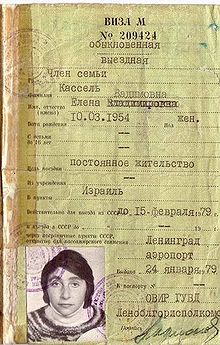- Refusenik
-
For other uses, see Refusenik (disambiguation).
 January 10, 1973. Jewish refuseniks demonstrate in front of the Ministry of Internal Affairs for the right to emigrate to Israel
January 10, 1973. Jewish refuseniks demonstrate in front of the Ministry of Internal Affairs for the right to emigrate to Israel
Refusenik (Russian: отказник, otkaznik, from "отказ", otkaz "refusal") was an unofficial term for individuals, typically but not exclusively, Soviet Jews, who were denied permission to emigrate abroad by the authorities of the former Soviet Union and other countries of the Eastern bloc.[1] The term refusenik is derived from the "refusal" handed down to a prospective emigrant from the Soviet authorities.
Over time, "refusenik" has entered colloquial English usage for any type of protester.[citation needed]
Contents
History
A large number of Soviet Jews applied for exit visas to leave the Soviet Union, especially in the period following the 1967 Six-Day War. While some were allowed to leave, many were refused permission to emigrate, either immediately or after their cases would languish for years in the OVIR (ОВиР, "Отдел Виз и Регистрации", "Otdel Viz i Registratsii", English: Office of Visas and Registration), the MVD department responsible for exit visas. In many instances, the reason given for denial was that these persons had been given access, at some point in their careers, to information vital to Soviet national security and could not now be allowed to leave.[2]
During the Cold War, Soviet Jews were thought to be a security liability or possible traitors.[3] To apply for an exit visa, the applicants (and often their entire families) would have to quit their jobs, which in turn would make them vulnerable to charges of social parasitism, a criminal offense.[2]
Many Jews encountered institutional antisemitism which blocked their opportunities for advancement. Some government sectors were almost entirely off-limits to Jews.[3][4] In addition, Soviet restrictions on religious education and expression prevented Jews from engaging in Jewish cultural and religious life. While these restrictions led many Jews to seek emigration,[5] requesting an exit visa was itself seen as an act of betrayal by Soviet authorities. Thus, prospective emigrants requested permission to emigrate at great personal risk, knowing that an official refusal would often be accompanied by dismissal from work and other forms of social ostracism and economic pressure.
A leading proponent and spokesman of the refusenik movement during the 1970s was Natan Sharansky. Sharansky's involvement with the Moscow Helsinki Monitoring Group helped to establish the struggle for emigration rights within the greater context of the human rights movement in the USSR. His arrest on charges of espionage and treason, and subsequent trial contributed to international support for the refusenik cause.
Refuseniks included Jews who desired to emigrate on religious grounds, Jews seeking to immigrate to Israel for Zionist aspirations, and relatively secular Jews desiring to escape continuous state-sponsored antisemitism. Also, large numbers of other ethnic groups tried to escape persecutions or desired to seek a better life, including Volga Germans attempting to leave for Germany and Armenians wanting to join their diaspora.
The coming to power of Mikhail Gorbachev in the Soviet Union in the mid-1980s and his policies of glasnost and perestroika, as well as a desire for better relations with the West, led to major changes, and most refuseniks were allowed to emigrate. With the dissolution of the Soviet Union at the end of the decade, the term "otkaznik" largely passed into history.
See also
- Eastern Bloc emigration and defection
- Aliyah from the Soviet Union and post-Soviet states
- The dissolution of the Soviet Union and emigration to Israel
- Herman Branover
- Defection
- Lishkat Hakesher
- Jackson-Vanik amendment
- Balseros, Cuban citizens who are not legally allowed to migrate and cross to Florida in improvised boats.
- Movement to Free Soviet Jewry
- Iosif Begun
Memoirs
- Natan Sharansky, Fear No Evil. The Classic Memoir of One Man's Triumph over a Police State. ISBN 1-891620-02-9.
- Chaim Potok, Gates of November: Chronicles of the Slepak Family ISBN 0-394588-67-3
Fiction
- David Shrayer-Petrov (Russian: Шраер-Петров, Давид), Herbert and Nelly (a novel, in Russian, abridged 1986; complete 1992, 2006). A saga of a refusenik family set in Moscow in the 1980s.
Documentary films
- In 2008 filmmaker Laura Bialis released a documentary film, Refusenik, chronicling the human rights struggle of the Soviet refuseniks.[6]
References
- ^ Mark Azbel' and Grace Pierce Forbes. Refusenik, trapped in the Soviet Union. Houghton Mifflin, 1981. ISBN 0395302269
- ^ a b The Right to Emigrate, cont. Beyond the Pale. The History of Jews in Russia. Exhibit by Friends and Partners
- ^ a b Joseph Dunner. Anti-Jewish discrimination since the end of World War II. Case Studies on Human Rights and Fundamental Freedoms: A World Survey. Vol. 1. Willem A. Veenhoven and Winifred Crum Ewing (Editors). Martinus Nijhoff Publishers. 1975. Hague. ISBN 90-247-1779-5, 90-247-1780-9; pages 69-82
- ^ Benjamin Pinkus. The Jews of the Soviet Union: the history of a national minority. Cambridge University Press, January 1990. ISBN 9780521389266; pp. 229-230.
- ^ Boris Morozov (Editor). Documents on Soviet Jewish Emigration. Taylor & Francis, 1999. ISBN 9780714649115
- ^ The struggle behind the Iron Curtain. Philadelphia Daily News. June 27, 2008. Accessed June 28, 2008.
Categories:- Refuseniks
- Antisemitism in the Soviet Union
- History of Israel
- Jewish Russian and Soviet history
- Political repression in the Soviet Union
- Israel–Soviet Union relations
- Soviet Union–United States relations
- Soviet phraseology
- Soviet Jews
- Cold War
- Eastern Bloc
- Aliyah
Wikimedia Foundation. 2010.

